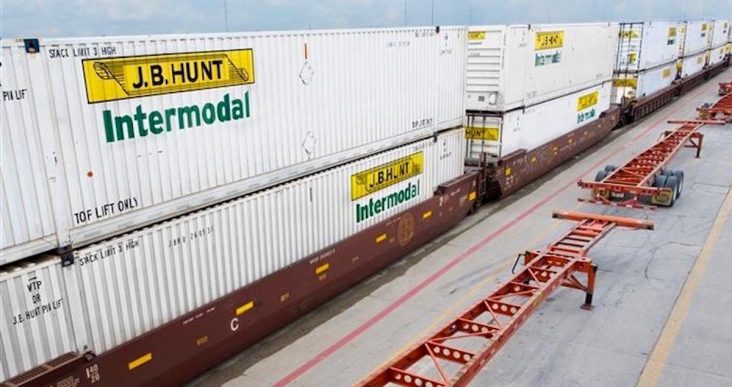Analysts expect J.B. Hunt Q1 earnings, revenue to fall
by April 10, 2023 3:26 pm 1,194 views

Lowell-based carrier J.B. Hunt Transport Services Inc. is projected to post earnings and revenue decreases for the first quarter of 2023 amid a softer freight market.
After the markets close April 17, J.B. Hunt is expected to report first-quarter earnings declined by 9.6% to $2.07 per share from $2.29 per share in the same period last year, based on a consensus of 20 analysts. Revenue is projected to fall by 1.5% to $3.44 billion from $3.48 billion.
In an earnings preview, analysts Justin Long and Jack Atkins, and associates Brady Lierz and Grant Smith, all of Little Rock-based Stephens Inc., expect J.B. Hunt’s first-quarter results to be slightly below Wall Street expectations. They attributed this to “weakness in the freight market, intermodal mix headwinds and a miss in the (brokerage) segment.”
The analysts also cut annual estimates for J.B. Hunt “as we see more uncertainty around the potential for a positive demand inflection in the next couple of quarters.” Still, they expect the company’s intermodal and dedicated segments, which comprises about 90% of operating income, to “be relatively resilient in a tough economic backdrop.” They attributed this to “an enhanced partnership with BNSF in intermodal and long-term contracts and secular growth drivers in dedicated.”
They continued to have a “positive multi-year view on (J.B. Hunt’s) growth/return profile, [and] we would be buying weakness in the stock driven by near-term cyclical headwinds.” The analysts maintained an overweight (buy rating) and reduced the 12-month price target by $5 to $200.
Shares of J.B. Hunt (NASDAQ: JBHT) closed Monday (April 10) at $174.14, up $4.11 or 2.42%. In the past 52 weeks, the stock has ranged between $153.92 and $200.64.
The following is a segment preview:
- Intermodal
Demand has been weaker than expected so far this year as a result of soft import trends that are affecting transcontinental volumes. Eastern intermodal volumes are benefiting from truck-to-rail conversions as service recovers. However, revenue per load is lower in the East because of the shorter length of haul. Margins are expected to be 11%, down from 11.5% in the previous quarter, as assessorial fees decline.
Analysts believe J.B. Hunt can grow intermodal volumes in 2023 from 2022 because of market share gains. The trend is expected to continue as BNSF service metrics improve. Bid season is about halfway completed, and analysts expect bid decreases in the mid-single digits.
- Dedicated
Analysts expected the segment to be J.B. Hunt’s “most resilient business this year.” They attributed this to how the segment is structured and margin expansion opportunities as startup costs decrease.
Operating income is expected to rise in 2023 from 2022. The analysts expect the segment to hold “relatively steady” from the fourth quarter of 2022 to the first quarter of 2023.
- Brokerage
Volumes are projected to fall by 25% in the quarter from the same period last year. They attributed this to the decline in spot market volumes amid the recent weakness in the freight market. Gross margins are projected to fall by 2.3 percentage points to 13.3% from the fourth quarter. First-quarter margins typically rise by 0.3 percentage points from the fourth quarter.
The analysts don’t expect J.B. Hunt to cut its “operating cost structure as it focuses on keeping the resources/technology in place to improve market share and profitability whenever the cycle inflects positively.”
